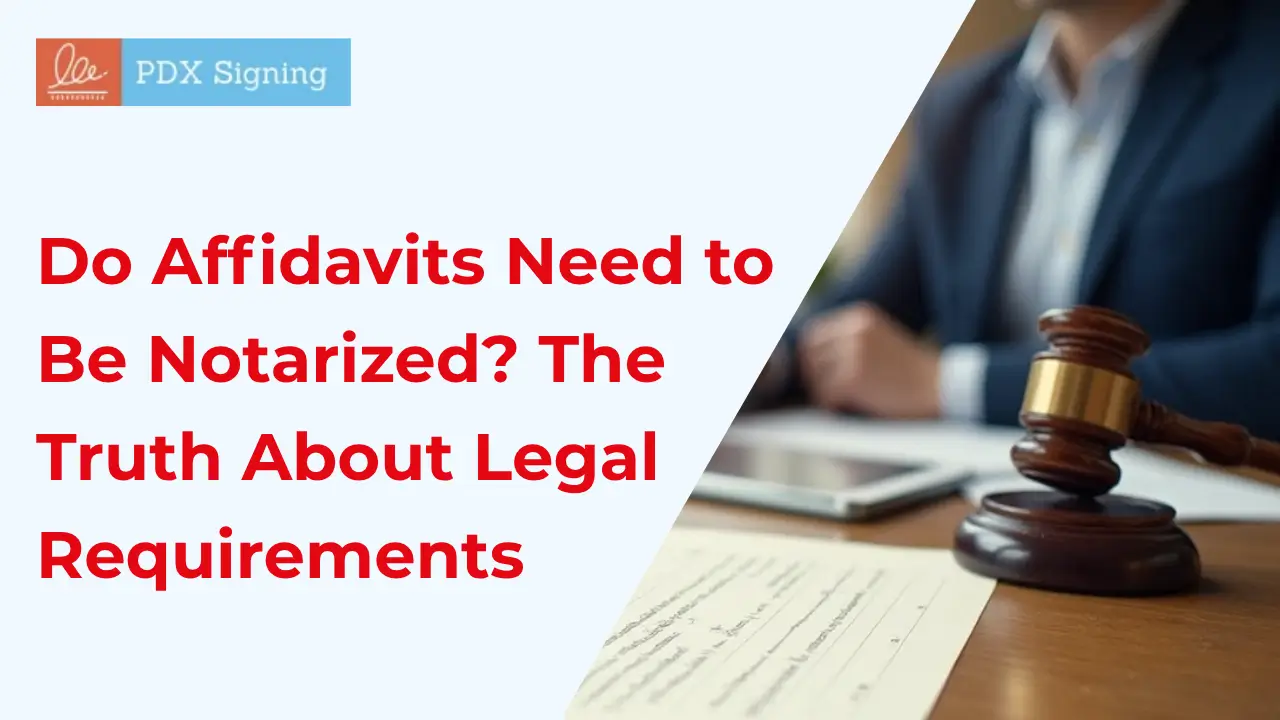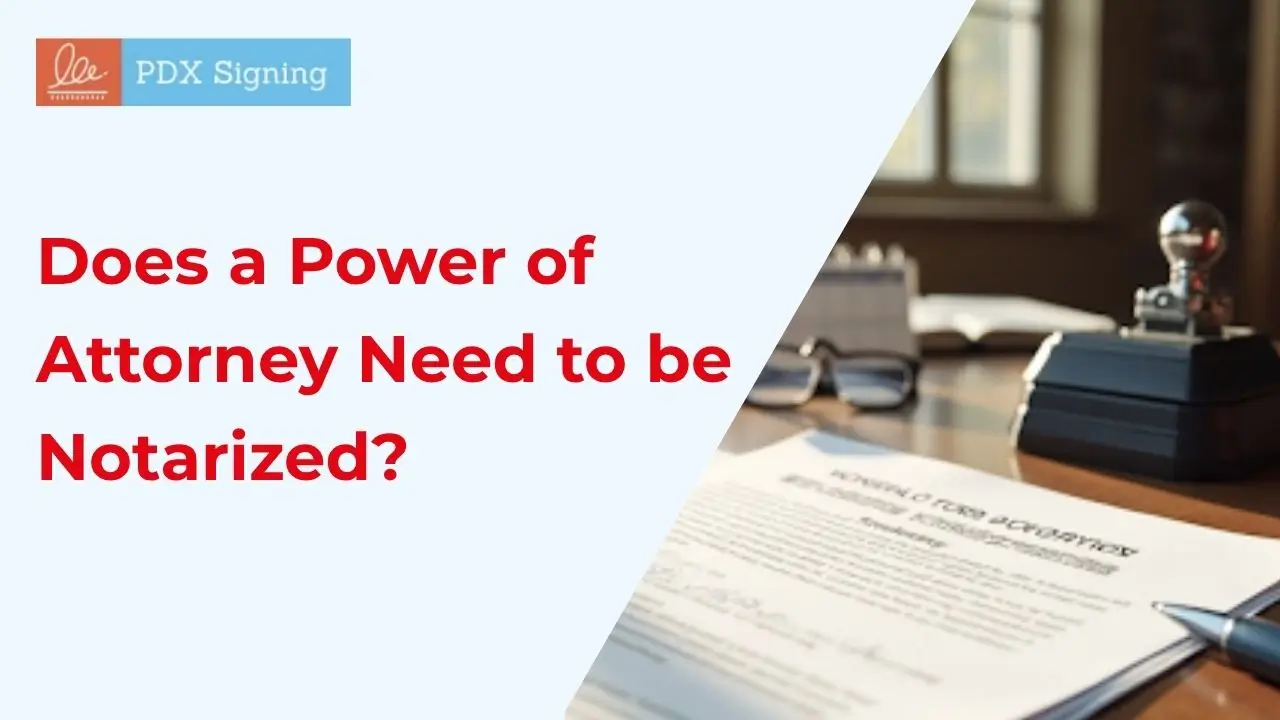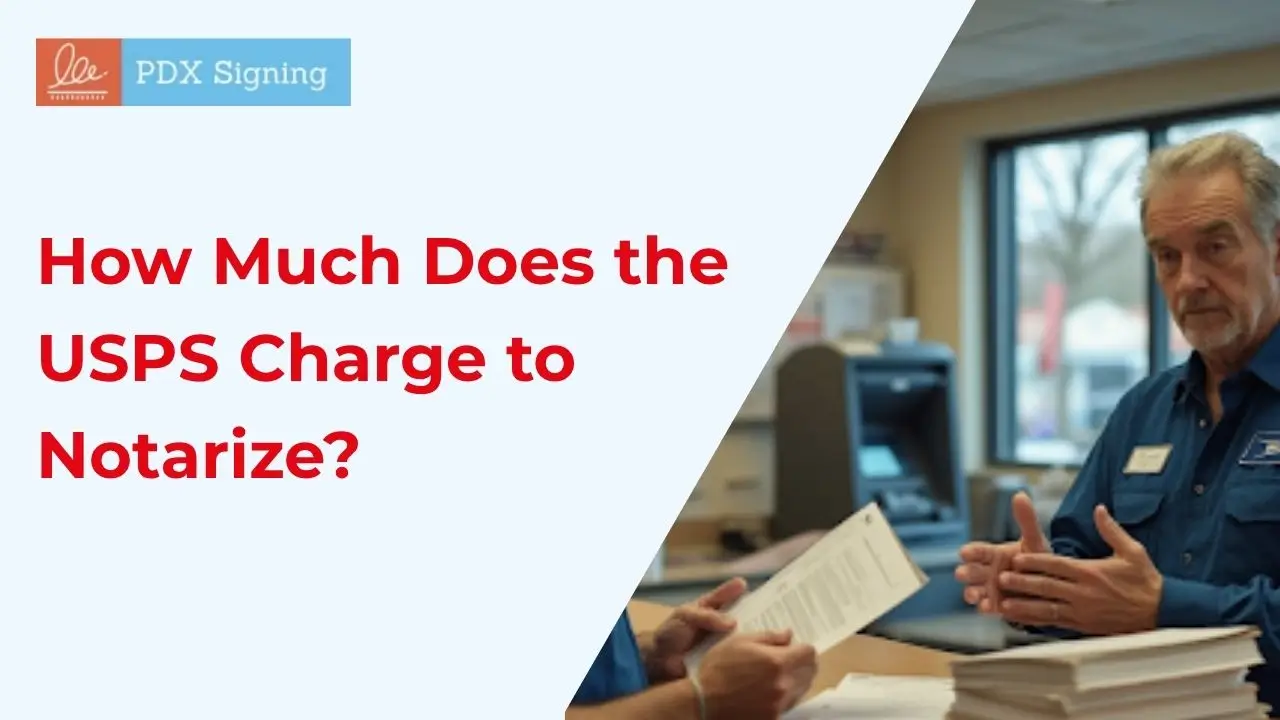Many people wonder about USPS notary service charges when they need important documents notarized. The answer might surprise you – USPS doesn’t offer notary services at any of its locations.
The United States sees over a billion documents notarized yearly, but USPS isn’t one of the service providers. USPS employees can’t provide notarization because of their status as federal employees. Notaries work on a state-by-state basis. On top of that, it takes specific training and expertise that USPS staff members don’t possess.
Let’s clear up some common misconceptions about USPS notary services. We’ll explain why this service isn’t available and show you some practical, affordable alternatives to get your documents notarized quickly. For professional notary services, visit PDX Signing.
Does USPS Offer Notary Services?
People often feel confused about USPS notary services. Many Americans think they can get their documents notarized at their local post office since it’s a trusted government institution that handles important mail and documents.
Why does USPS not notarize documents?
Legal restrictions prevent USPS from offering notary services. State governments authorize notary publics, and each state has its own rules and regulations. USPS works as a federal agency. This creates a legal barrier that stops postal employees from notarizing documents.
Notarization needs special training and certification that most USPS employees don’t have. Each state requires specific qualifications. Postal workers must pass exams and complete required training to become certified notary publics. Their focus stays on mail and shipping services, so they don’t need these credentials.
Common misconceptions about USPS notary service
Several reasons explain why this myth about USPS notary services keeps going around:
People mix up USPS with private shipping companies like UPS or FedEx stores which do offer notary services. The similar names and shipping services make this confusion pretty common.
Many people think USPS provides cheap or free notarization. This idea comes from the post office’s history of offering affordable government services.
The confusion also happens because USPS offers services that look like notarization, such as certified mail, registered mail, and signature confirmation. These services verify documents but serve completely different purposes from notarization.
What USPS locations may offer instead?
Some post office buildings have private businesses that might offer notary services. These businesses run independently, even though they share space with USPS.
Post offices provide other document services like passport application processing that people sometimes mistake for notarization. You can also get various mail verification sservicesincluding certified mail with return receipt that proves delivery, but this isn’t the same as notarization.
Banks, shipping stores, law offices, or online notary platforms would be better places to look for notary services than your local post office.
How Much Does the USPS Charge to Notarize?
Looking up “USPS notary fees” online can leave you with mixed and conflicting information. Let’s clear things up once and for all.
Clarifying the USPS notary cost myth.
Many people think they can get notary services at USPS locations, but that’s not true at any price. The United States Postal Service doesn’t provide notary services. This myth continues even though USPS staff lack the certification and training needed to handle notarial acts.
You might see websites claiming that “USPS notary services are not free”. This statement misleads people by suggesting these services exist but cost money. The truth is simple: USPS notary fees don’t exist because they don’t offer the service at all.
Why are USPS notary fees not listed
The official USPS website and service guides won’t show any notary fees. The reason is straightforward: USPS operates as a federal entity and can’t perform notarizations that states regulate. This means USPS has no fee schedule for notarization.
State laws and federal postal operations work differently. That’s why you won’t find any official USPS notary costs. Federal postal workers can’t legally handle duties that belong to state-commissioned notaries, whatever the convenience might be for customers.
What to expect if a private notary is inside a USPS building
USPS buildings sometimes house private businesses that offer notary services, even though USPS itself doesn’t notarize documents. These businesses operate completely independently from USPS.
The fees at these locations usually range from $5 to $20 per signature, based on state rules and the notary’s rates. A USPS Form 1583 notarization for mail forwarding services typically costs about $25.
These notaries work for private companies that rent space in the building, not for USPS. Their services and fees have nothing to do with USPS operations, and USPS doesn’t get any share of these notary fees.
Where to Get Documents Notarized Instead

The USPS doesn’t offer notarization, but you’ll find plenty of reliable alternatives. These options are more convenient and affordable than most people expect.
Banks and credit unions
Most U.S. banks have notaries ready to help, including big names like JPMorgan Chase, Bank of America, and Wells Fargo. Account holders can usually get these services free. Non-customers might pay a small fee or may not get service at all. Credit unions work much the same way. Their members often get free notary services. DCU serves as a good example – members just need a photo ID and their unsigned documents.
Law firms and real estate offices
You’ll find notaries at many legal offices ready to help clients. The core team at law firms can authenticate various documents like contracts, powers of attorney, affidavits, and deeds. Real estate offices also keep notaries on staff to handle closing documents. This makes them a reliable choice to process property paperwork.
Mobile notary services
Mobile notaries come right to your doorstep. These professionals meet you at home, work, or anywhere convenient. The fees start higher, usually around $75-$80, but that covers travel time and expenses. People with limited mobility or busy schedules find these services particularly helpful.
Online notary platforms like PandaDoc
Remote Online Notarization (RON) services are accessible to more people now. PandaDoc Notary provides state-approved RON services with secure, legally binding document processing. The platform lets you create, edit, sign, and notarize documents online quickly. Other services like Notarize give you 24/7 notary access, typically charging around $25 per notarization.
Courthouses and local government offices
Local government offices, courthouses, city halls, and public libraries offer notary services. These places often charge the least, and some even provide free notarization to residents. State offices like the Michigan Department of State commission thousands of notaries each month, making services readily available.
How to Save on Notary Fees
Notary services can be affordable. Smart planning and knowing where to look will help you get documents notarized cheaply or even for free. Here are four quick ways to save money on notary fees.
Use your bank’s free notary service.
Most physical banks and credit unions give free notary services to their account holders. Bank of America clearly states that they provide notary services “at no cost to our customers”. Chase Bank and Capital One customers also get these services free. You can still visit a nearby branch to ask about fees as a non-customer, but expect to pay $15-20 per document. A quick call ahead will confirm if a notary is available that day. The service comes at no cost if you’re already banking with them.
Bundle multiple documents
Bundling documents that need notarization will save you money. Schedule one appointment with a notary instead of making separate trips for each document. This method “ensures all paperwork is notarized accurately and securely” in “one seamless session”. Some notaries give better rates if you bring multiple documents at once, making this the quickest way to save money.
Ask friends or family who are notaries.
Your network could help you find affordable notarization. Workplace friends, community members, or social media contacts might know notaries who’ll help at lower rates or for free. One expert says, “Don’t underestimate the power of your personal and professional networks”. Facebook or community boards could help you find notary connections nearby.
Check with local legal aid organizations.
Legal aid organizations and government offices often provide notary services for free. The Justice Resource Center “offers notarization of family law documents for free”. Military members can get these services through military resource centers at no cost. Courts, public libraries, and community centers usually offer cheap or free notarization. These options help people who need to watch their spending.
Conclusion
Let’s clear up a common misconception about USPS notary services – they don’t exist. The United States Postal Service cannot legally provide notarization because of jurisdictional differences between federal and state authorities. Postal workers also lack the specialized training and certification to perform these official acts.
You have many options available for document notarization. Banks and credit unions are convenient choices, especially when you have an account, since many offer free services to their customers. Law offices, real estate agencies, and mobile notaries provide expandable solutions based on your needs. On top of that, online notary platforms make document authentication more available than ever before.
Don’t waste time going to the post office for notarization. USPS excels at many mail-related services, but notarization isn’t one of them. With these insights, you’ll save time, money, and frustration by going straight to the right place for your notarization needs. For reliable notary services, check out PDX Signing.
FAQs
Q1. Does the USPS offer notary services?
No, the United States Postal Service does not provide notary services. As a federal agency, USPS is not authorized to perform notarizations, which are regulated at the state level.
Q2. Where can I get documents notarized if not at the post office?
You can get documents notarized at banks, credit unions, law firms, real estate offices, mobile notary services, online notary platforms, and some local government offices. Many banks may offer free notary services to their account holders.
Q3. How much does notarization typically cost?
Notarization fees vary, but they generally range from $5 to $20 per signature. Some places, like banks, may offer free notary services to their customers. Mobile notaries often charge higher fees, starting around $75-$80, to cover travel expenses.
Q4. Are there ways to save money on notary fees?
Yes, you can save on notary fees by using your bank’s free notary service if you’re an account holder, bundling multiple documents for notarization in one session, asking friends or family who are notaries, or checking with local legal aid organizations that may offer free services.
Q5. Can I get documents notarized online?
Yes, Remote Online Notarization (RON) services are available through platforms like PandaDoc Notary. These services allow you to create, edit, sign, and notarize documents online, typically costing around $25 per notarization and offering 24/7 access to notaries.






